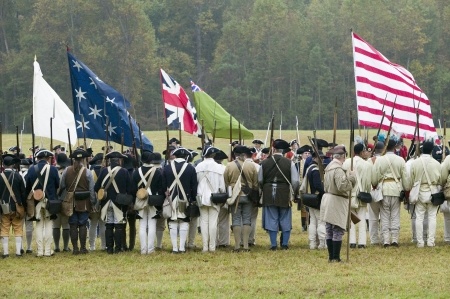Several decades ago, the Virginia Tourism Corporation adopted the slogan “Virginia Is for Lovers,” and indeed, what’s not to love about Virginia (also known as “Old Dominion”) with its remarkable beauty, warm Southern hospitality, and rich historical past?
Thirteen years before the Mayflower sailed from London, there was Jamestown, the first permanent settlement in North America. Although the small colony had a rocky beginning, with a brief abandonment in 1610, and the infamous lost outpost colony at Roanoke, Europeans saw opportunities in Virginia not possible in the Old World, and they endured incredible hardships to make Virginia a viable new home. And where there were people over 400 years ago, there are family historians today hoping for records of those early settlers.
The most thorough compilation of genealogical information for these first Virginians is the 3-volume work Adventurers of Purse and Person, Virginia, 1607-1624/5, Fourth Edition, by John Frederick Dorman. The set documents the descendancy of 150 original Virginia families for six generations. Furthermore, your ancestors don’t have to have arrived in Virginia that early to be included – if they married a descendant of one of the families who was included in the “Muster of 1624/5,” (basically a census taken by the Royal Commission in England) within those first six generations, their families, well documented, will be included. The three volumes together contain more than 3,400 pages of invaluable genealogical data. Sold separately, the combined volumes cost more than $300, well worth the price if you have numerous early Virginia lines in your pedigree. But if the price puts this work out of reach, check with your local library, and if it is not in their collection, consider Interlibrary Loan. Be sure to order the correct volume, as they break out alphabetically:
- Volume One, Part A, is for Families A-Ch
- Volume One, Part B, is for Families Cl-F
- Volume Two is for Families G-P
- Volume Three is for Families R-Z
For later Virginia families, numerous websites offer extensive help for the genealogy researcher, some for subscription fees, but also many for free. The Library of Virginia is a good place to start. The online catalog includes thousands of tempting titles from county land records to Confederate Disability Applications to digitized photographs, and many items in the collection can also be borrowed through Interlibrary Loan at your local library. If you can visit the Library of Virginia in person, you can obtain a library card and, with it, access even more family history research from your home computer.
Virginia genealogical researchers should also investigate the Virginia Genealogy site. The right side of the homepage contains links to useful sites, some free, others connecting with databases on Ancestry.com. One of my favorite free links is Biographies, an easy-to-use alphabetical listing of tens of thousands of biographies not only from Virginia but from all over the country. However, the majority of the links here take you to subscription-based Ancestry.com pages. If you already have an Ancestry subscription but do not regularly use the “Card Catalogue” feature found in the pull-down menu from the “Search” button, you will be pleasantly surprised at the wide variety of digitized, fully searchable books you can access. There are searches specific to Virginia with titles such as Virginia Navy in the Revolution; Pittsylvania County, Virginia, History; History of Tazewell County and Southwest Virginia, 1748-1920, and thousands more.
Most genealogical researchers regularly use the invaluable and ever-growing site familysearch.org. From the “Records” page, be sure to note the “Browse All Published Collections” section in the bottom left corner. Select the United States, and then “Virginia” on the next page. Here you will find 14 Virginia-specific genealogical databases, 11 of which contain fully digitized, searchable images, while the other 3 are indexed to transcriptions. You will find early Virginia databases such as “Virginia, Isle of Wight County Records, 1634-1951,” to more recent “Virginia, Danville City Cemetery Records, 1833-2006” to enable you to discover your early Virginians.
If you would love assistance with your Old Dominion genealogical research, contact the professional genealogists at RecordClick. We’re here to help you with your ancestor search.







